The English Strike Back
Date: 2003-04-16
_________________
As the first British Racketlon Open were held in London last
weekend, for the first time in the history of racketlon, there
was a non-Scandinavian finalist in an international tournament. John
O'Donnell, a 35-year-old english former squash professional
took on the visiting force of eleven players of the Scandinavian
racketlon establishment (ten Swedes and one Finn, comprising the
second wave of a viking invasion that was initiated at English Open last October) and
made it all the way to the final where experienced Swedish
racketlete Rickard Persson was waiting. Persson won the
title by a margin of +9 points (21-6, 7-21, 18-21, 21-10).
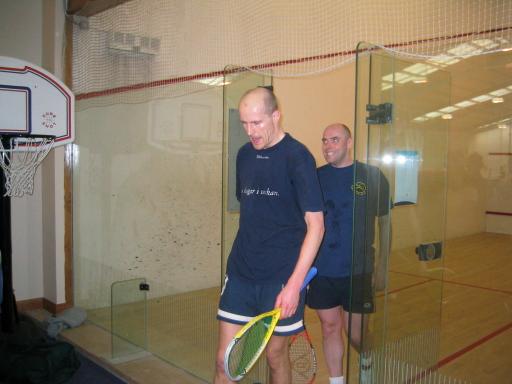
The final. Persson and O'Donnell. O'Donnell still happy after
squash.
The British Open result meant for O'Donnell a leap from 28 to 14
on the Racketlon World ranking (updated
list out today) which means that he moved ahead of Scotland's
Steve Thomson to the position as the best ranked
racketlon player in the UK. If one considers that he played his
first racketlon tournament only a few months ago (Swedish Open in
Stockholm in January) it seems likely that O'Donnell could become
a serious contender for the World Championship title this year
already. All the more so if one takes into account two remarkable
developments on O'Donnell's path to the final;
First, in the second round against French World #11 Nicolas
Sene; Not many would have placed their bets on O'Donnell
after the first three sets. He was admittedly in the lead by 9
points after having won both table tennis and squash convincingly
(former badminton French national team player Sene was expectedly
out of reach in badminton) but given that tennis is his weakest
link while Sene is a good quality player it did not look good. As
expected Sene took a firm grip of the tennis set and advanced
rapidly to a 15-6 lead. But then O'Donnell suddenly started to
win points. The audience would not believe their eyes as long
"soft" rallies that sometimes contained up to 40 hits
over the net, most of them sliced with safe squash technique
(particularily on behalf of O'Donnell) slowly gave him the
advantage.
Second, in the semifinal against Marcel Weigl (Austria);
Although most people expected O'Donnell to win the initial table
tennis set fairly easily Weigl got on to a good start taking the
lead by 9-15. Then, in a recovery of an extent possibly never
before seen in the history of racketlon O'Donnell took 12(!)
straight points thereby winning the set with 21-15. That paved
the ground for an O'Donnell victory by +24 points (21-15, 21-5,
21-18!) a margin that would probably have been much smaller if
tennis specialist Weigl had only got the opportunity to play the
last set.
So, it seems obvious that O'Donnell already is in possession of
some of the psychological/tactical qualities widely known to play
such an important role in the game of racketlon; The ability to
play well against someone who is much superior/inferior than
yourself and the ability to focus on the fact that every point
counts from start. A girlfriend at ringside committed to taking
up statistics on winning/loosing shots adds further clarity to
the picture. There is no doubt about the purpose in mind of this
Englishman.
Tournament of Surprises
O'Donnell was not the only player that did better than expected
in this event. British Open could quite adequately, in fact, be
labeled a "tournament of surprises". In the Men's Open
class only one of the top 4 seeds made it to the semifinal(!)
which was also the case in the Men's Amateur class.
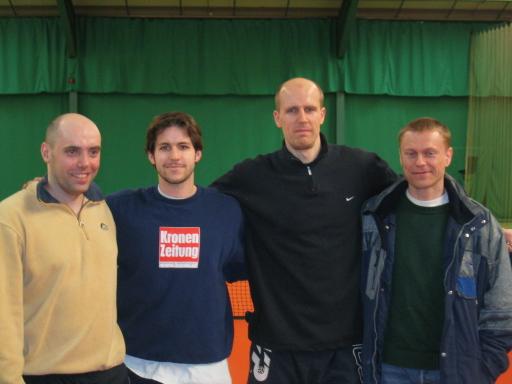
The semifnalists. John O'Donnell, Marcel Weigl, Rickard
Persson and Magnus Eliasson.
The #1 seed, Sweden's charismatic World #1 Magnus Eliasson
lost in the semifinal to Rickard Persson after having had to stop
the match when he suffered an unfortunate foot injury at a point
when the match still looked remarkably undecided (9-21, 21-7,
11-10 injury!; Eliasson's score first). The #3 seed Nicolas Sene
(France) and #6 seed Joakim Sandberg (Sweden) both lost
to O'Donnell. The #4 seed Stefan Larsson (Sweden) lost
to the winner Rickard Persson and the #2 seed Ola Carleke
(Sweden) lost to Marcel Weigl, which was probably the
biggest surprise of them all. Weigl, who was the only Austrian in
British Open, had only taken part in one international event
before this - Swedish Open in January - where he lost in the
first round of the Class 1 event. Therefore, it must have come as
something of a shock to Ola Carleke, world ranked #8 and a World
Championship semifinalist in Gothenburg last year, to live
through a match where he lost everything but squash - in table
tennis by as much as 8-21.
Finally, of course, the winner himself, Rickard Persson, was a
great surprise. Persson, a journalist and former elite table
tennis player from Írebro in Sweden was only seeded #5 but
turned out to be the only one that could properly defend Swedish
racketlon domination this time. This victory improved his world
ranking from 14 to 8.
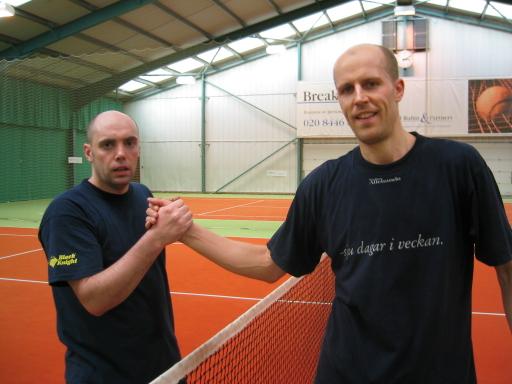
The winner of British Open 2003. World #8 Rickard Persson.
Racketlon is spreading
British Open was a great success in many respects. Facilities at
the David Lloyd sport center in Watford/Bushey were excellent,
tournament management was smooth and the marketing preceeding the
event was quite successful as shown by the attendance rate of 55
players making it the biggest international racketlon event
outside Scandinavia sofar. But in one respect the tournament
really excelled; by the number of nationalities taking part. They
were no less than 10! Beside England and Sweden there were
players from Finland, France, Austria and Scotland. In addition,
there were four nations never before seen in a racketlon match;
Belgium, South Africa, Portugal and Nigeria(!) - marking, also,
the advent of the first non-European racketlon players. A more
international racketlon event has indeed never been played
before! Not even the World Championships last November attracted
more than 8 nations.

The organizer, Stuart Foster.
Of particular interest were the two Belgian participants, Luc
Van Bogaert and Gert Peersman. They could inform
about a Belgian multi-racket tradition sofar unknown to the
Racketlon community. A tournament called "King of
Rackets" involving the same four sports as racketlon has
apparently been arranged every year since 1993 nowadays
attracting no less than around 140 people. The format is quite
close to racketlon in the sense that it involves straight
counting where every point counts but it does not, however,
contain true racketlon matches where the same two people face
each other in all four sports. Instead, the event starts out with
play in small groups of some 4 people where everybody plays
everybody in each sport in best of three games. (Straight
counting. The first two games are played to 11. If a third game
is needed it is played to 7.) All points gathered in the group
play are then summed up for each player. The players that have
gained the most points continue to the play-off, the others are
knocked out. The play-off consists of four separate traditional
knock-out tournaments, one for each of the four sports. All
players that have qualified for the play-off take part in all
four tournaments. When all tournaments have been played all
points from them are summed up. The total winner of the event,
i.e. the King of Rackets, is the player with most points.
The next King of Rackets tournament is only a few weeks away. It
is due to take place on the two first weekends of next month (1,
2, 4 and 10 May). See the invitation (flamish only) on www.recrean.be/html/anderen/Kingofrackets.html
( See also an account of the history of the king of rackets
tournament on www.recrean.be/html/Activiteiten/Voorbije/Kingofrackets.html
)
Luc Van Bogaert, with a solid background in table tennis, won the
King of Rackets tournament in both 1997 and 1999. Therefore, his
second round encounter with World Champion Magnus Eliasson came
close of being a match between the Swedish and Belgian number
ones. Eliasson started out by loosing the table tennis game quite
heavily and Belgian hopes were still high as the initial squash
points were quite tight. But, in a manner not unusual for
Eliasson, he had soon squeezed much of the energy out of his
opponent and after squash he could move forward to a convincing
victory by +25 points - a margin small enough, however, to
indicate that Van Bogaert cannot be that far behind many of the
other top international racketlon players. World Champion
Eliasson is, after all, almost an exception.
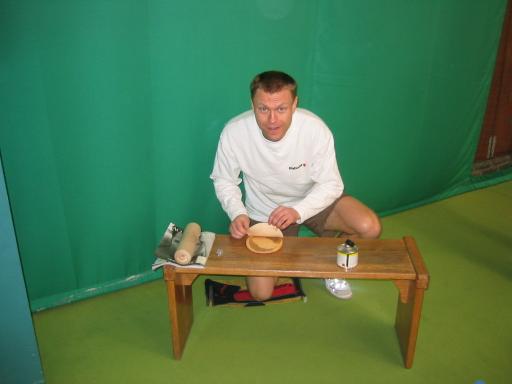
World Champion Eliasson applying fresh glue on his table
tennis bat.
Racketlon @ David Lloyd's
Another indication of the fact that the game of racketlon is
spreading to an ever wider audience was the visit to the
tournament paid by Stewart Miller, the Managing Director
of David Lloyd
Leisure, the UK's market leader in health and fitness
clubs with over 40 sport centers - out of which 38 are potential
racketlon centers - scattered all over England. Miller has very
quickly understood that if racketlon gets popular in England it
would have a direct impact on demand for the David Lloyd's
products and action seems not far away. The intention is to
introduce the game of racketlon to the English youth by staging
open house testing sessions. This is really promising news to
racketlon. If it gets a foothold within the David Lloyd
organization it could really break through in England, given also
the fact that squash is bigger there than probably anywhere else.
The Tour Continues
British Open was the second event of eight on the IRF Racketlon World Tour. The next
tournament will be held in Lahti, Finland, 17-18 May. Then
tournaments in Bulgaria, Scotland, Austria and England (again)
will follow until the tour finally peaks with the World
Championships in Gothenburg the first weekend of November. Look
under EVENTS on the www.racketlon.com startpage for more
information on how to apply for each of these events.
Racketlon enthusiasts that would like to stage an event on the
tour during 2004 - or even the World Championships - should
indicate their interest by an e-mail to the IRF (
racketlon@hotmail.com ) before this year's World Championships.
The tour calendar will be planned during November and fixed by
the first of December.
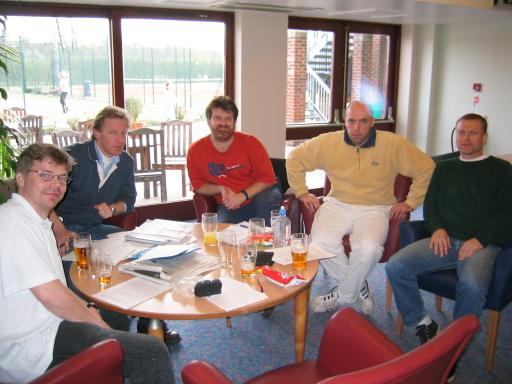
Some of the members of the IRF Council drafting the future of
the game of Racketlon.
_________________________________




